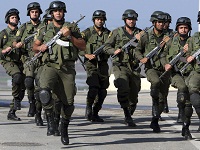Master of unipolar world benefits from Middle East conflicts
Despite the cease fire agreement between Palestinians and Israelis, the situation in the Middle East is heating up. In Syria, battles with rebels are ongoing, Egypt is protesting against the policies of President Mursi, and Israel is preparing to repel attacks from the Gaza Strip. Local conflicts are rapidly becoming global, but who is behind them and who benefits from them?
Analyzing the events of 2012, the experts time and again return to the role of the U.S. and its NATO allies in the international politics. Recently, the West virtually recognized insurgency in Syria as legitimate. Russia and China condemn such interference in the internal affairs of the country. Tehran openly supported the regime of Bashar al-Assad, which also does not help to stop the bloodshed.

A dangerous situation emerged in early October, when a Syrian shell exploded in Turkey. In response to the incident, Ankara began serious preparations for a war by transferring land and air forces closer to the border of Syria. There was a smell of war in the air. At the initial stage of the conflict the issue of invasion into Syria was not seriously considered by the Turkish Prime Minister Recep Tayyip Erdogan. However, NATO has shown open support for Turkey (in particular, a plan to deploy missile components "Patriot" in the area was made public).
"The current conflict is beneficial only to the United States of America, as the owner of the unipolar world," said in an interview with Pravda.Ru State Duma deputy Yevgeny Fyodorov. "The world is in a situation where all the time there is a possibility of launching of a full-scale military conflict that, in fact, may be the beginning of a full-scale world war. In this regard, Israel is no exception. Look how it all began: there was an artificial shot, and exchange of blows, and somewhat sudden conflict as a result. According to the logic of the conflict, this is a test of strength of some very major world power, which, thanks to intelligence capabilities, can add fuel to the fire. Analytically, as, obviously, there are not facts to confirm it, I think this is one of the tests of the United States of America touching various tense parts of the world.
However, even in the U.S. government there may not be as many supporters of unleashing a major war in the Middle East, with the exception of the "hawks." Analysts believe that the U.S. would have tightened its policy toward Syria, Iran and North Korea had a Republican Mitt Romney, who also named Russia the main geopolitical opponent of the United States, won the election. After Barack Obama's win in the presidential election, talks of G6 and international mediators with Iran over Tehran's nuclear program are back on the agenda.
The significance of these negotiations is difficult to overestimate. Further aggravation of contradictions between the U.S. and Israel on the one hand, and Iran and its allies, on the other hand, is a bigger threat to peace and stability in the region. The situation is reminiscent of that before the First World War. Then two military coalitions - the Entente and the Triple Alliance - were ready for a large-scale conflict. Only a cause was missing, and it was soon found by the Austro-Hungarian Empire after the assassination of Archduke Franz Ferdinand in Sarajevo.
Of course, analysts prefer to draw such parallels with caution: you cannot step in the same river twice. However, internationalization of regional conflicts is of great concern to political scientists and military experts. The war between Israel and the Gaza Strip that lasted only eight days held the entire region in tension. Hamas is openly supported not only by Iran and Lebanon, but also "Hezbollah" and Sudan.
The U.S. supported Israel, but at the same time took a number of diplomatic steps towards an early settlement of the conflict. But the civil war in Syria is far from complete. Another question is how long can the regime of Bashar al-Assad hold, relying on the Shiite minority and loyalist troops.
"An attempt to draw Turkey into the civil war in Syria was obvious, said Evgeny Fedorov. "It has failed. An attempt to draw Israel into it when the shooting started has also failed. Because, in fact, there is a coalition of countries that do not wish to launch this world war, and the coalition is directed against the United States. If this resistance to aggression and launching of the world war continues for a couple of years, the United States simply will not stand the competition, because it will be hit by the global crisis after Europe. "
Yuri Sosinsky-Semikhat
Pravda.Ru
Subscribe to Pravda.Ru Telegram channel, Facebook, RSS!

